- Home
- Fergus Hume
The Mystery of a Hansom Cab Page 14
The Mystery of a Hansom Cab Read online
Page 14
‘Light that,’ cried the detective in a peremptory tone of voice. ‘What do you mean by dowsing the glim?’
Thieves’ argot was, evidently, well understood here, for there was a shuffle in the dark, a muttered voice, and then someone lit the candle with a match. This time Calton saw the light was held by an elfish-looking child, with a scowling white face, and tangled masses of black hair, which hung over her eyes. She was crouching down on the floor, against the damp wall, and looked up at the detective defiantly, yet with a certain fear in her eyes, as though she were a wild animal, cowed against her will.
‘Where’s Mother Guttersnipe?’ asked the detective sharply, touching her with his foot, an indignity she resented with a malignant glance, and arose quickly to her feet. ‘Upstairs,’ she replied, jerking her head in the direction of the right wall, in which Calton, his eyes being more accustomed to the flickering light of the candle, could see a gaping black chasm, which he presumed was the stair alluded to. ‘You won’t get much out of ’er tonight—she’s a-goin’ to start ’er booze, she is.’
‘Never mind what she’s doing,’ said Kilsip sharply, ‘take me to her at once.’
The girl gave him a sullen look, and with reluctant feet led the way into the black chasm and up the stairs, which were so shaky that Calton was in terror lest they should be precipitated into unknown depths. He held on firmly to his companion’s arm, as they toiled slowly up the broken steps, and at last stopped at a door through the cracks of which a faint glimmer of light could be seen. Here the girl gave a shrill whistle, and the door opened as if by magic. Still preceded by their elfish guide, Calton and the detective stepped through the doorway, and a curious scene was presented to their view.
It was a small square room, with a low roof, from which the paper, mildewed and torn, hung in tatters; on the left hand, at the far end, was a kind of low stretcher, upon which a woman, almost naked, was lying, amid a heap of frowsy greasy clothes. She appeared to be ill, for she kept tossing her head from side to side restlessly, and every now and then sang snatches of old songs in a shrill, cracked voice. In the centre of the room was a rough deal table, upon which stood a guttering tallow candle, which but faintly illuminated the scene, and a half empty square bottle of schnapps, with a broken cup beside it. In front of these signs of festivity sat an old woman with a pack of cards spread out before her, and from which she had evidently been telling the fortune of a villainous-looking young man, who had opened the door, and who stood looking at the detective with no very friendly expression of countenance. He was dressed in a greasy brown velvet coat, much patched, and a black wide-awake hat, which was pulled down over his eyes. He looked like one of those Italians who retail ice-cream on the street, or carry round organs with monkeys on them, and his expression was so scowling and vindictive that the barrister thought it was not very hard to tell his ultimate destiny—Pentridge, or the gallows.
As they entered the fortune-teller raised her head, and, shading her eyes with one skinny hand, looked curiously at the newcomers. Calton thought he had never seen such a repulsive looking old crone; and, indeed, she was worthy of the pencil of Doré to depict, such was the grotesque ugliness which she exhibited. Her face was seamed and lined with innumerable wrinkles, clearly defined by the dirt which was in them; bushy grey eyebrows, drawn frowningly over two piercing black eyes, whose light was undimmed by age; a hook nose, like the beak of a bird of prey, and a thin lipped mouth, with two long yellow tusks sticking out like those of a wild boar. Her hair was very luxurious and almost white, and was tied up in a great bunch by a greasy bit of black ribbon. As to her chin Calton, when he saw it wagging to and fro, involuntarily quoted Macbeth’s lines about the witches—
Ye should be women
And yet your beards forbid me to interpret
That ye are so.
And, indeed, she was no bad representative of the weird sisters.
This lady looked viciously at them when they entered, and demanded sulkily, ‘What the ’ell they wanted?’
‘Want your booze,’ cried the child with an elfish laugh, as she shook back her tangled hair.
‘Get out, you whelp,’ croaked the old hag, shaking one skinny fist at her, ‘or I’ll tear your heart out, cuss you.’
‘Yes, she can go,’ said Kilsip, nodding to the girl, ‘and you can clear too,’ he added, sharply turning to the young man, who still stood holding the door open. At first he seemed inclined to dispute the detective’s order, but ultimately obeyed him, muttering as he went out something about ‘the bloomin’ cheek of showin’ swells cove’s cribs.’ The child followed him out, her exit being accelerated by Mother Guttersnipe, who, with a rapidity only attained by long practice, seized the shoe off one of her feet and flung it at the head of the rapidly retreating girl.
‘Wait till I ketches yer, Lizer,’ she shrieked, with a volley of curses, ‘I’ll break yer ’ead, blarst ye.’
Lizer responded with a shrill laugh of disdain, and vanished through the shaky door, which she closed after her.
When she had disappeared Mother Guttersnipe took a drink out of the broken cup, and, gathering all her greasy cards together in a business-like way, looked insinuatingly at Calton, with a suggestive leer.
‘It’s the future ye want unveiled, dearie,’ she croaked, rapidly shuffling the cards, ‘an’ old mother ’ull tell—’
‘No, she won’t,’ interrupted the detective sharply, ‘I’ve come on business.’
The old woman started at this, and looked keenly at him from under her bushy eyebrows.
‘What ’ave the boys bin up to now?’ she asked harshly. ‘There ain’t no swag ’ere this time, blarst ye.’
Just then the sick woman, who had been restlessly tossing on the bed, commenced singing a snatch of the quaint old ballad of Barbara Allen—
Oh, mither, mither, mak’ my bed,
An’ mak’ it saft an’ narrow;
Since my true love died for me today,
I’ll die for him tomorrow.
‘Shut up, cuss you,’ yelled Mother Guttersnipe, viciously, ‘or I’ll knock yer bloomin’ ’ead orf,’ and she seized the square bottle as if to carry out her threat; but, altering her mind, she poured some of its contents into the cup, and drank it off with avidity.
‘The woman seems ill,’ said Calton, casting a shuddering glance at the stretcher.
‘So she are, damn her,’ growled Mother Guttersnipe, angrily. ‘She ought to be in Yarrer Bend, she ought, instead of stoppin’ ’ere an’ singin’ them beastly things, which makes my blood run cold. Just ’ear ’er,’ she said, viciously, as the sick woman broke out once more—
Oh, little did my mither think,
When first she cradled me;
I’d die sa far awa’ fra home,
Upon the gallows tree.
‘Yah!’ said the old woman, hastily, drinking some more gin out of the cup. ‘She’s allay’s a-talkin’ of dyin’ an’ gallers, as if they were nice things to jawr about.’
‘Who was that woman who died here three or four weeks ago?’ asked Kilsip, sharply.
‘’Ow the ’ell should I know,’ retorted Mother Guttersnipe, sullenly. ‘I didn’t kill ’er did I? It were the brandy she drank, she was allays, drinkin’ cuss ’er.’
‘Do you remember the night she died?’
‘No, I don’t,’ answered the beldame, frankly. ‘I were drunk—blind, bloomin’, blazin’ drunk—s’elp me Gawd.’
‘You’re always drunk,’ said Kilsip.
‘What if I am?’ snarled the woman, seizing her bottle. ‘You don’t pay fur. it. Yes, I’m drunk. I’m allays drunk. I was drunk last night, an’ the night before, an’ I’m a-goin’ to git drunk tonight,’ with an expressive look at the bottle, ‘an’ tomorrow night, an’ I’ll keep it up till I’m rottin’ in the grave, blarst an’ cuss ye.’
Calton shuddered, so full of hatred and suppressed malignity was her voice, but the detective merely shrugged his shoulders.
‘Mo
re fool you,’ he said, briefly. ‘Come now, on the night the “Queen,” as you call her, died, there was a gentleman came to see her?’
‘So she said,’ retorted Mother Guttersnipe, ‘but, lor’, I dunno anythin’, I were drunk.’
‘Who said—the “Queen”?’
‘No, my gran’-darter Sal, the “Queen” sent ’er to fetch the toff to see ’er cut ’er lucky, wanted ’im to look at ’is work, I ’spose cuss ’im, and Sal prigged some paper from my box,’ she shrieked, indignantly. ‘Prigged it w’en I were too drunk to stop ’er.’
The detective glanced at Calton, who nodded to him with a gratified expression on his face. They were right as to the paper having been stolen from the villa, at Toorak.
‘You did not see the gentleman who came?’ said Kilsip, turning again to the old hag.
‘Not I, cuss you,’ she retorted, politely. ‘’E came about ’arf past one in the morning, an’ you don’t expects we can stop up all night, blarst ye.’
‘Half past one o’clock,’ repeated Calton, quickly. ‘The very time. Is this true?’
‘Wish I may die if it ain’t,’ said Mother Guttersnipe, graciously. ‘My gran’-darter Sal kin tell ye.’
‘Where is she?’ asked Kilsip, sharply.
At this, the old woman threw back her head and howled in a dismal manner.
‘She’s ’ooked it,’ she wailed, drumming on the ground with her feet. ‘Gon’ an’ left ’er pore old gran’ an’ joined the Army, cuss ’em, a-comin’ round an’ a-spilin’ business.’
Here the woman on the bed broke out again—
Since the flowers o’ the forest are a’ wed awa’.
‘Fur Gawd’s sake ’old yer jawr,’ yelled Mother Guttersnipe, rising, and making a dart at the bed. ‘I’ll choke the life out of ye, s’elp me. D’y want me to murder ye, singin’ ’em blarsted funeral things?’
Meanwhile, the detective was talking rapidly to Mr Calton.
‘The only person who can prove Mr Fitzgerald was here between one and two o’clock,’ he said, quickly, ‘is Sal Rawlins, as everyone else seems to have been drunk or asleep. As she has joined the Salvation Army, I’ll go to the barracks the first thing in the morning and look for her.’
‘I hope you’ll find her,’ answered Calton, drawing a long breath. ‘A man’s life hangs on her evidence.’
They turned to go, Calton having first given Mother Guttersnipe some loose silver, which she seized on with an avaricious clutch.
‘You’ll drink it, I suppose,’ said the barrister, shrinking back from her.
‘Werry likely,’ retorted the hag, with a repulsive grin, tying the money up in a piece of her dress, which she tore off for the purpose. ‘I’m a forting to the public ’ouse, I am, an’ it’s the on’y pleasure I ’ave in my life, cuss it.’
The sight of money had a genial effect on her nature, for she held the candle at the head of the stairs as they went down, so that they would not break their heads. As they arrived safely, they saw the light vanish, and heard the sick woman singing, ‘The Last Rose of Summer,’ and then a volley of curses from Mother Guttersnipe.
The street door was open, and after groping their way along the dark passage, with its pitfalls, they found themselves in the open street.
‘Thank heaven,’ said Calton, taking off his hat, and drawing a long breath. ‘Thank heaven we are safely out of that den.’
‘At all events, our journey has not been wasted,’ said the detective, as they walked along. ‘We’ve found out where Mr Fitzgerald was the night of the murder, so he will be safe.’
‘That depends upon Sal Rawlins,’ answered Calton, gravely, ‘but, come, let us have a glass of brandy, for I feel quite ill after my experience of low life.’
CHAPTER SIXTEEN
MISSING
The next day Kilsip called at Calton’s office late in the afternoon, and found the lawyer eagerly expecting him. The detective’s face, however, looked rather dismal, and Calton was not reassured by its expression.
‘Well!’ he said impatiently, when Kilsip had closed the door and taken his seat, ‘Where is she?’
‘That’s just what I want to know,’ answered the detective, coolly. ‘I went to the Salvation Army headquarters and made enquiries about her. It appears that she had been in the army as an hallelujah lass, but got tired of it in a week, and went off with a friend of hers to Sydney. She carried on her old life of dissipation, but ultimately her friend got sick of her, and the last thing they heard about her was that she had taken up with a Chinaman in one of the Sydney slums. I telegraphed at once to Sydney, and got a reply that there was no person of the name of Sal Rawlins known to the Sydney police, but they said they would make enquiries, and let me know the result.’
‘Ah! she has no doubt changed her name,’ said Calton, thoughtfully stroking his chin. ‘I wonder what for?’
‘Wanted to get rid of the Army, I expect,’ answered Kilsip, dryly. ‘The straying lamb did not care about being hunted back to the fold.’
‘And when did she join the Army?’
‘The very day after the murder.’
‘Rather sudden conversion.’
‘Yes, but she said the death of the woman on Thursday night had so startled her, that she went straight off to the Army to get her religion properly fixed up.’
‘The effects of fright no doubt,’ said Calton, dryly. ‘I’ve met a good many examples of these sudden conversions, but they never last long as a rule—it’s a case of the devil was sick, the devil a monk would be, more than anything else. Good-looking?’
‘So-so, I believe,’ replied Kilsip, shrugging his shoulders. ‘Very ignorant—could neither read nor write.’
‘That accounts for her not asking for Fitzgerald when she called at the club—she probably did not know whom she had been sent for. It will resolve itself into a question of identification, I expect. However, if the police can’t find her, we will put an advertisement in the papers offering a reward, and send out handbills to the same effect. She must be found. Brian Fitzgerald’s life hangs on a thread, and that thread is Sal Rawlins.’
‘Yes,’ assented Kilsip, rubbing his hands together. ‘Even if Mr Fitzgerald acknowledges that he was at Mother Guttersnipe’s on the night in question, she will have to prove that he was there, as no one else saw him.’
‘Are you sure of that?’
‘As sure as anyone can be in such a case—it was a late hour when he came, and everyone seems to have been asleep except the dying woman and Sal, and as one is dead, the other is the only person who can prove that he was there at the time when the murder was being committed in the hansom.’
‘And Mother Guttersnipe?’
‘Was drunk as she acknowledged last night. She thought that if a gentleman did call, it must have been the other one.’
‘The other one,’ repeated Calton in a puzzled voice. ‘What other one?’
‘Oliver Whyte.’
Calton arose from his seat with a blank air of astonishment. ‘Oliver Whyte,’ he said, as soon as he could find his voice. ‘Was he in the habit of going there?’
Kilsip curled himself up in his seat like a sleek cat, and pushing forward his head till his nose looked like the beak of a bird of prey, looked keenly at Calton.
‘Look here, sir,’ he said in his low, purring voice, ‘there’s a good deal in this case which don’t seem plain—in fact, the further we go into it, the more mixed up it seems to get. I went to see Mother Guttersnipe this morning, and she told me that Whyte had visited the “Queen” several times while she lay ill, and seemed to be pretty well acquainted with her.’
‘But who the devil is this woman they call the “Queen”?’ said Calton irritably. ‘She seems to be at the bottom of the whole affair—every path we take leads to her.’
‘I know hardly anything about her,’ replied Kilsip, ‘except that she was a good-looking woman, of about forty-nine—she came out from England to Sydney a few months ago, then on to here—how she go
t to Mother Guttersnipe’s I can’t find out, though I’ve tried to pump that old woman, but she’s as close as wax, and it’s my belief she knows more about this dead woman than she chooses to tell.’
‘But what could she have told Fitzgerald, to make him act in this silly manner—a stranger who comes from England and dies in a Melbourne slum, can’t possibly know anything about Miss Frettlby.’
‘Not unless Miss Frettlby was secretly married to Whyte,’ suggested Kilsip, ‘and the “Queen” knew it.’
‘Nonsense,’ retorted Calton sharply. ‘Why, she hated him and loves Fitzgerald; besides, why on earth should she marry secretly, and make a confident of a woman in one of the lowest parts of Melbourne? At one time her father wanted her to marry Whyte, but she made such strong opposition, that he eventually gave his consent to her engagement with Fitzgerald.’
‘And Whyte?’
‘Oh, he had a row with Mr Frettlby, and left the house in a rage—he was murdered the same night, for the sake of some papers he carried.’
‘Oh, that’s Gorby’s idea,’ said Kilsip scornfully, with a vicious snarl.
‘And it’s mine, too,’ answered Calton, firmly. ‘Whyte had some valuable papers, which he always carried about with him. The woman who died evidently told Fitzgerald that he did, as I gathered as much from an accidental admission he made.’
Kilsip looked puzzled.
‘I must confess that it is a riddle,’ he said, at length; ‘but if Mr Fitzgerald would only speak, it would clear everything up.’
‘What about who murdered Whyte?’

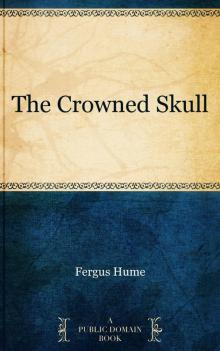 The Crowned Skull
The Crowned Skull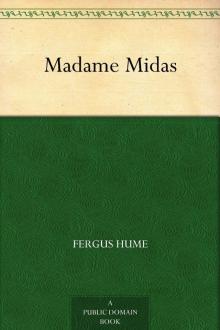 Madame Midas
Madame Midas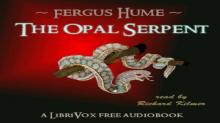 The Opal Serpent
The Opal Serpent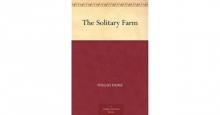 The Solitary Farm
The Solitary Farm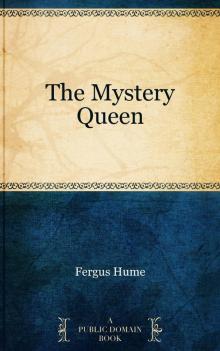 The Mystery Queen
The Mystery Queen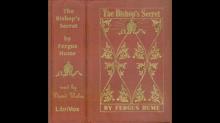 The Bishop's Secret
The Bishop's Secret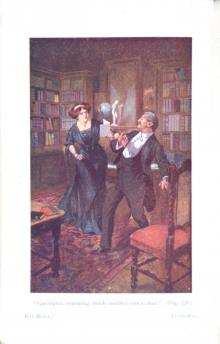 Red Money
Red Money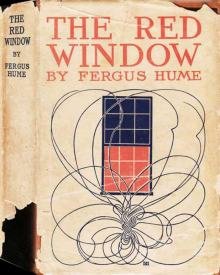 The Red Window
The Red Window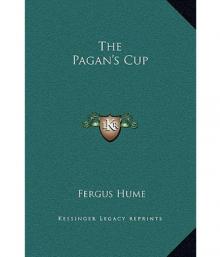 The Pagan's Cup
The Pagan's Cup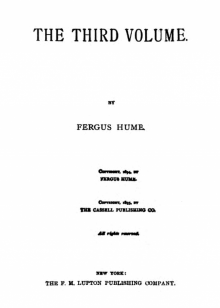 The Third Volume
The Third Volume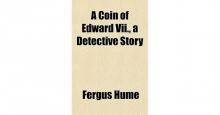 A Coin of Edward VII: A Detective Story
A Coin of Edward VII: A Detective Story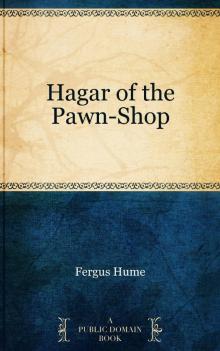 Hagar of the Pawn-Shop
Hagar of the Pawn-Shop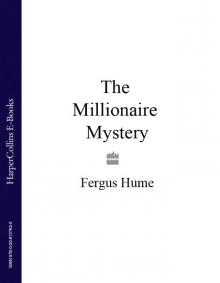 The Millionaire Mystery
The Millionaire Mystery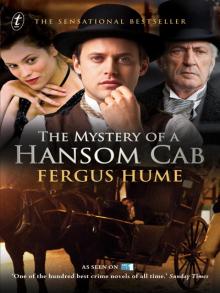 The Mystery of a Hansom Cab
The Mystery of a Hansom Cab